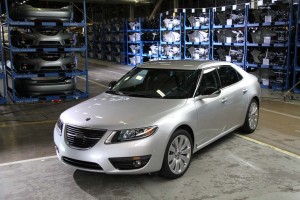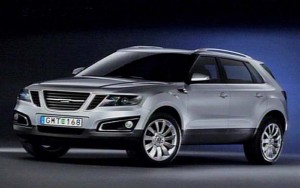Swedish automaker Saab has found its white knight – or more accurately several of them – securing at least its near-term survival.
The maker has lined up a new alliance with ambitious Chinese manufacturer Hawtai Automotive Group, while also securing some much-needed cash in the form of a loan from the Gemini Investment Fund. Meanwhile, Saab officials say they anticipate a further investment will follow from Russian businessman Vladimir Antonov.
The impact of the various deals will be significant for cash-starved Saab, both in the short and long-term. The initial financial infusion – 180 million Euros, or $266 million – should permit Saab to quickly re-open the headquarters assembly plant, in Trollhattan, Sweden, that was shuttered on March 29th due to a boycott by unpaid suppliers.
The alliance will also provide a manufacturing base for Saab in China, which the company hopes will significantly expand its presence in the world’s largest and fastest-growing automotive market.
Longer-term, Saab Chairman Victor Muller told TheDetroitBureau.com, Saab may now be able to fund the development of some much-desired new product programs, including a small luxury car tentatively named the 9-2, and possibly a large SUV, among other vehicle options.
The tie-up with Hawtai “allows Saab…to continue executing its business plan since we secured the required mid-term financing,” proclaimed Muller, while also permitting the company “to enter the Chinese car market and establish a technology partnership with a strong Chinese manufacturer.
Saab is the second Swedish carmaker to form ties with a Chinese automaker, Ford Motor Co. last year selling its Volvo subsidiary to the ambitious Geely. The Saab deal is more limited, Hawtai investing 120 million Euros to acquire a 29.9% stake in the Swedish company’s parent, Spyker Cars NV – the same stake currently held by Muller, a Dutch entrepreneur.
Hawtai, meanwhile, also will issue a 30 million Euro short-term loan, convertible to Saab stock. That is the same figure – with the same terms – as a loan Saab secured from Gemini.
The tie-up with the Chinese comes as an unexpected twist to a story that began in 2008, when former Saab owner General Motors said it wanted to either sell or close the long-struggling Swedish carmaker. In the months ollowing GM’s 2009 bankruptcy, the American maker began winding down operations in Trollhattan, but Muller mounted a last-minute bid that saved the company – although it took seven weeks after the acquisition was completed before Saab’s plant was up-and-running again.
That delay triggered a cash crunch that caught up with Saab in March, suppliers refusing to continue providing the parts necessary to build Saab’s 9-5 and 9-3 models. Desperate for a financial infusion, Saab turned to Vladimir Antonov, a Russian oligarch who had been an early investor in Spyker – but who GM demanded leave the country before it would sell Saab to the Dutch company.
In March, Antonov proposed buying the Trollhattan plant and other Saab assets, leasing them back to the Swedes. But the plan has been hung up for weeks while the European Investment Bank considered the proposal. A frustrated Muller decided to look for other options, turning to the Chinese.
Meanwhile, Antonov is “very much in favor” of the Chinese investment and may still seek to invest in Saab, the carmaker’s chairman said during a conference call with international journalists following a Tuesday afternoon news conference in Beijing.
Hawtai is a small but aggressive automaker; launched just 10 years ago, sales barely nudged the 50,000 mark by 2009, but riding the massive boom in demand in the Chinese market, it is targeting sales of 500,000 within five years, Muller noted.
That would include Chinese sales of Saab products, some of which will now be produced at Hawtai plants.
“This will in no way impact Saab production in Sweden,” said Muller, though he revised that thought a moment later, suggesting that if Hawtai can open up the Chinese market, “we would see the number of Saabs being imported in(to) china going up, not down. Those cars would be produced in Trollhattan,”
Muller also left the door open to the possibility of producing Chinese products in Sweden, though he joked that, “If it would make money we would make cars from the North Pole.”
Ironically, the European Investment Bank is set to release nearly 30 million Euros, in the coming days, from the original 400 million Euro loan negotiated at the time of the Saab acquisition. But that money can only be used for product development and related purposes, not for day-to-day operations – which created the original sticking point that sent Saab looking for help.
The Swedish maker is in the midst of its largest product roll-out ever. The recently-launched 9-5 is being followed by the new 9-4X crossover and a variety of variants based off existing models, such as the 9-5 SportCombi. An all-new version of the smaller 9-3 is due out in barely a year.
But Muller has said that he’d like to add other models, notably including a compact luxury car that would likely be called the 9-2, and which would go up against the likes of the Audi A3 in one of the upscale car market’s fastest-growing segments.
Muller cautioned that the new funds Saab has raised must first go to working capital, but he made it clear the company is eyeing the 9-2 project, “a car we so eagerly want,” and may look for additional alliances to make that project happen. The likelihood now “does bode well.”
The Dutch executive also told TheDetroitBureau.com that Saab will “look at the specific needs of the Chinese market,” which could lead it to develop some additional product lines.
“There is strong demand for very large SUVs in China,” he said, adding “something larger than the (midsize) 9-4X is thinkable,” though he quickly cautioned it is “way too soon to go there.”
Perhaps, but the Hawtai and Gemini deals clearly are giving Saab’s management the breathing room they need to think about the long-term and not just the company’s day-to-day survival.



